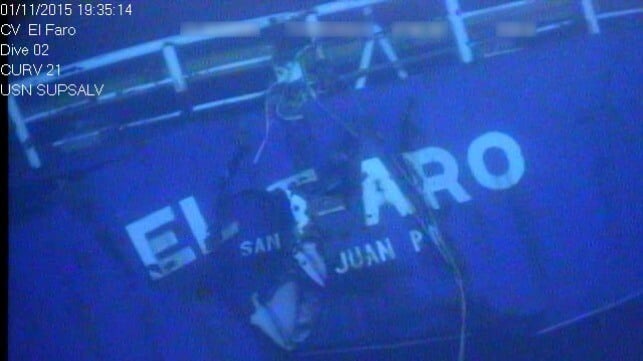10 Years Later, Mariners Remember the Loss of the El Faro

It has been 10 years since the con/ro steamship SS El Faro went down with all hands in a hurricane, and it remains one of the deadliest maritime disasters in recent American history. 33 mariners lost their life in the sinking, and the victims' memory is preserved at memorial sites in Maine and in Florida, as well as annual remembrance ceremonies.
While El Faro was under way from Jacksonville to San Juan, Puerto Rico, her master put her on a course that would take her past the Bahamas and into the path of a strengthening hurricane. As weather conditions worsened, she took on water in a cargo hold and developed a list, leading to loss of lube oil suction for her steam turbine. El Faro lost propulsion and drifted beam to the seas, and flooding gradually overtook her. Within hours, she went down, in heaving seas and far from any aid. All 33 people aboard were killed, including 28 American mariners and a riding gang of five Polish workers.
A years-long inquiry identified human mistakes and oversight failures at the root of the disaster. The master was relying on delayed weather data, not the latest forecasts, and the Coast Guard concluded that he and his company did not fully understand the limits of El Faro's operating capabilities in heavy weather - limits that were reduced by a vessel conversion project in 2005-6. Poor bridge resource management, complacency and lack of training were identified as contributing human factors. Once in harm's way, the ship was overmatched by the extreme conditions near the eye of a Category 3 storm.
"The El Faro crew did not have adequate knowledge of the ship or ship’s systems to identify the sources of the flooding, nor did they have equipment or training to properly respond to the flooding," the Coast Guard determined. "Even though El Faro met applicable intact and damage stability standards . . . the vessel could not have survived uncontrolled flooding of even a single cargo hold given the extreme wind and sea conditions encountered in Hurricane Joaquin."
There were regulatory findings, too. After examining the inspection records of the El Faro and sister ship El Yunque - which was scrapped after significant wastage was found - the Coast Guard decided to take a close look at the Alternate Compliance Program (ACP), which allows certain class societies to perform statutory inspections of U.S. commercial vessels. The Coast Guard's inspectors found 660 deficiences aboard 52 ACP-enrolled ships, and they revoked the Certificate of Inspection (COI) for six vessels. Based on this pattern of issues, the service called for "seminal change in the overall management and execution of the [ACP]" in order to make sure that vessels enrolled in the program are safe. In response, the Coast Guard created a new Flag State Control Division at its Washington headquarters to oversee class society performance, and encouraged its front-line safety inspectors to provide more rigorous oversight.
The Coast Guard's board of investigation also recommended the elimination and replacement of all open lifeboats, like those aboard El Faro. Compared to modern enclosed lifeboats, the outmoded open boats have limited survivability in extreme weather conditions. Coast Guard leadership disagreed with this costly retrofit proposal, and a handful of aging vessels with open lifeboats remain in U.S. service today.
A day of remembrance
On Wednesday, multiple American maritime institutions and groups paused to reflect on El Faro's legacy and remember her crew. At Maine Maritime Academy, the alma mater of five El Faro victims, the campus held a ceremony to honor their legacy. “There’s still some healing going on,” Maine Maritime Academy President Craig Johnson told local Fox23.
Another gathering was held in the vessel's home port of Jacksonville, Florida. "The reading of the names and the ringing of the bell, which is very emotional, that was the hardest part," said Deb Roberts, mother of El Faro victim Michael Holland, speaking to WMTW.
“I want the world to know that my husband tried his best to save that vessel,” said Rochelle Hamm, wife of one of El Faro's crewmembers, speaking to News4Jax at the ceremony. “He did his job and he did it with dignity. So, I’m proud to be his wife.”
